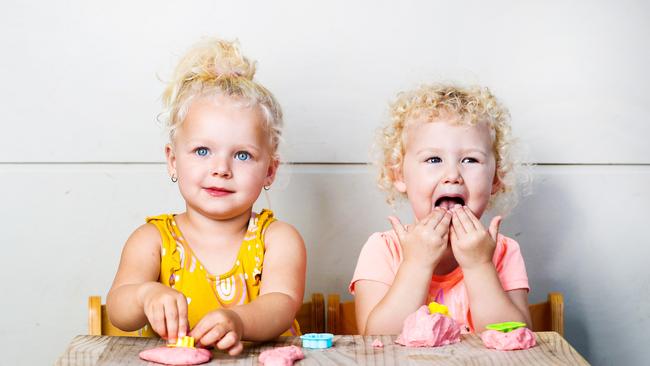Intensive new research finds no coeliac risk for kids in play items despite parents’ concern
Many Australian parents worry that their coeliac children are at risk from the gluten in common play materials like Play-Doh and pasta. Intensive new research has revealed the truth.

QLD News
Don't miss out on the headlines from QLD News. Followed categories will be added to My News.
MANY Australian parents worry that their coeliac children are at risk from the gluten in common play materials used in child care, but intensive new research shows their fears are unfounded, Coeliac Australia has revealed.
“We get calls all the time from parents who have small children who are regulars at kindy or preschool and they are concerned that constant exposure and handling of things like Play-Doh or pasta for pasta necklaces could be dangerous over time,” Coeliac Australia’s Sally Tobin told The Courier-Mail.
Coeliac disease, where sufferers have a gut sensitivity to gluten, impacts one in every 70 Australians.
Many children are diagnosed between six months and two years which is when most kids get their first taste of gluten in foods.
Gluten is a protein found in rye, barley and wheat products and is used to hold food together like a glue.
Is this Brisbane’s best gluten-free cafe?

A new study from Children’s National Hospital in the US and published in the Journal of Pediatric Gastroenterology and Nutrition has found no significant gluten transfer on hands or surfaces after children use the play items for sensory play.
The reports reveals school supplies and activities such as paper mache and baking projects with flour-based dough are associated with gluten transfer but gluten residue is not detected when hands and play surfaces are cleaned through basic hygiene including handwashing and routine surface cleaning.
New cafe, Trying 2B Good, treats Vegan and gluten free foodies
“Parents worry because small children often put things in their mouth. But with proper supervision the children should be in no danger. The gluten has to go through the gut for a problem to occur,” Ms Tobin said.
“Children are usually briefed on keeping their hands away from their mouths in these situations and school staff are well-equipped to keep them safe. Coeliac Australia has childcare resources for teachers,” she said.
“The numbers of children presenting with gluten problems is on the rise and it can be debilitating,” Ms Tobin said.


